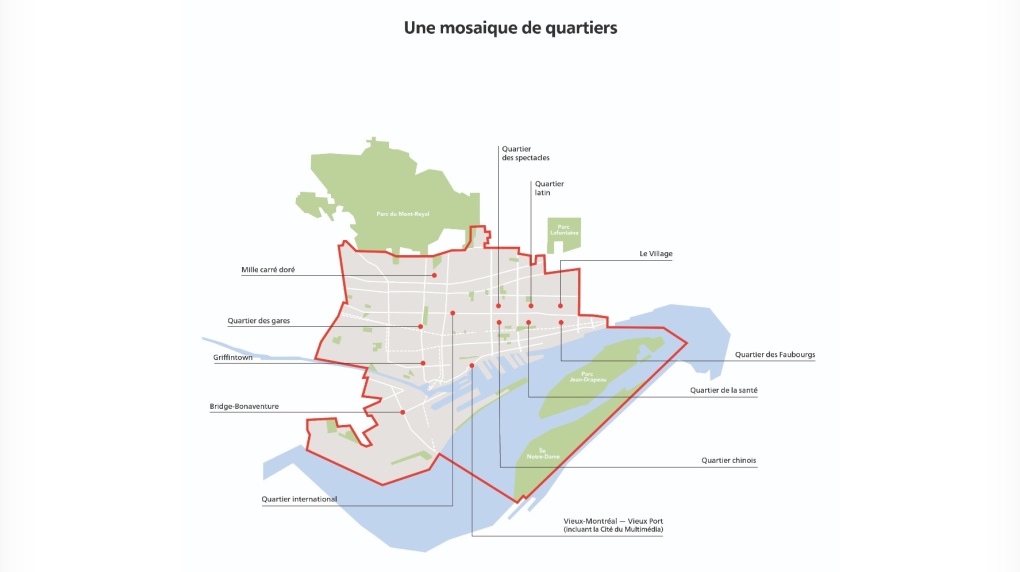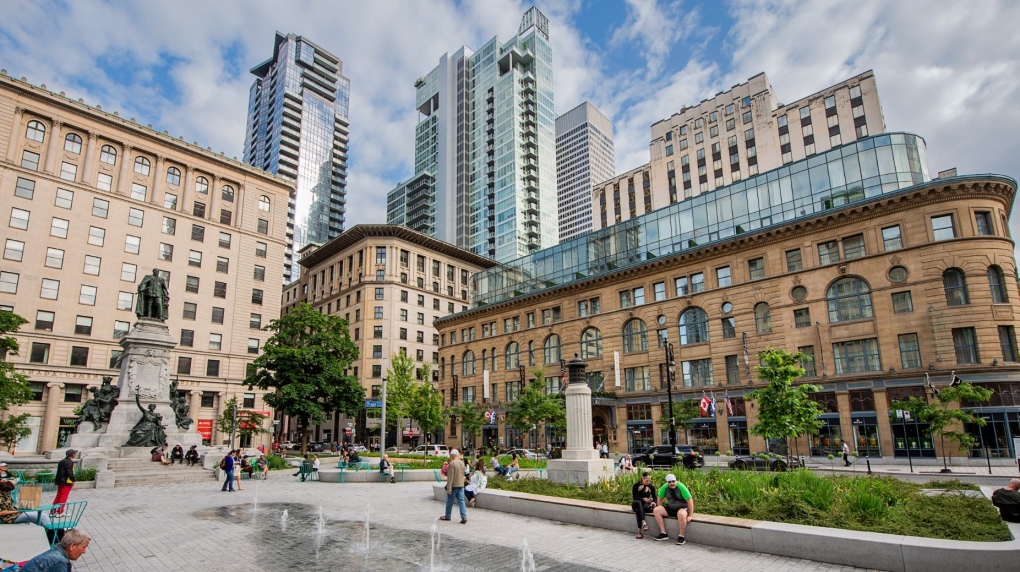Critics say 'nothing new' in Montreal's $1.8B plan to revitalize downtown core
The City of Montreal is promising a cleaner, more accessible downtown core with a new 10-year plan to bring life back to the area.
The $1.8-billion project was presented by Mayor Valerie Plante Tuesday, with a goal to keep downtown culturally vibrant and economically attractive.
The city said the downtown core is rebounding relatively well post-pandemic, but there are challenges that are not unique to Montreal.
The issues afflicting the area are happening internationally, Plante said, including lower occupancy rates in office buildings, a struggling retail sector, and social issues.
"Downtown is the economic and cultural heart of Quebec," said Plante in a news release.
The city's challenge amid these issues, she said, is "to rethink the long-term development of the downtown area and implement structuring initiatives to strengthen its attractiveness and resilience."
The city wants to create new living spaces and green spaces, improve mobility and cleanliness and focus on highlighting the unique character of different neighbourhoods within the core, like the Latin Quarter, the Village and Chinatown.
CRITICS UNIMPRESSED WITH CITY'S PLAN
The opposition points out there's not much new in this strategy and says 10 years is far too slow for a situation that is urgent.
"There's nothing new in terms of [construction site management], in terms of help towards the business owners in terms of actions in terms of security," said Julien Henault-Ratelle, the opposition critic for economic development.
There's also no mention in the plan of how to make streets safer. As the head of Montréal centre-ville points out homelessness isn't addressed either.
"It is perhaps the number one threat for our downtown … the homelessness situation, and the opioid crisis we're seeing in downtown," said Glenn Castanheira, general manager of Montreal Centre-Ville.
"Mind you, this is not exclusive to downtown. We've seen this happen in Vancouver and when I speak with my colleagues across Canada their number one issue is cohabitation with the homeless population."
It's also a concern shared by Henault-Ratelle.
"If you talk to different business owners, if you talk to different restaurants in The Village, they all don't feel safe and sadly the results of that is that Montrealers decide to go somewhere else, to Royalmount, to Longueuil, to Laval," he said.
 The City of Montreal wants to emphasize the unique character of downtown neighbourhoods (image: City of Montreal)
The City of Montreal wants to emphasize the unique character of downtown neighbourhoods (image: City of Montreal)
THREE PRIORITIES
The city outlined its three top priorities as follows:
Enhancing neighbourhood identity:
- Reinforcing the personality of neighbourhoods with distinctive new street furniture, heritage enhancements and public art circuits
- Celebrating downtown's northern character by creating a unique winter experience in the heart of the city
- Designating the Latin Quarter as a "Quartier de la francophonie," creating a 24-hour sector and carrying out major development projects, including Îlot Voyageur and Parc Émilie-Gamelin
Creating new, vibrant, mixed-use neighbourhoods
- Creating two new residential neighbourhoods in Les Faubourgs and Bridge-Bonaventure, with the potential to create over 15,000 housing units
- Consolidating downtown's position in the technology, health care and cultural and creative industries
- Prioritizing investment in existing buildings to reverse rising vacancy rates, particularly at the former Royal Victoria Hospital and the Îlot Voyageur
Improving mobility, cleanliness and creating green routes
- Accelerating the development of phase 3 of the Quartier international
- Creating better links between neighbourhoods and setting up a pedestrian-priority zone in Old Montreal
- Improving cleanliness of public spaces, building maintenance and management of works.
 The City of Montreal is planning to revitalize the downtown core (photo: Mathieu Sparks / City of Montreal)
The City of Montreal is planning to revitalize the downtown core (photo: Mathieu Sparks / City of Montreal)
With files from CTV News Montreal's Maya Johnson and Angela Mackenzie
CTVNews.ca Top Stories

W5 Investigates A 'ticking time bomb': Inside Syria's toughest prison holding accused high-ranking ISIS members
In the last of a three-part investigation, W5's Avery Haines was given rare access to a Syrian prison, where thousands of accused high-ranking ISIS members are being held.
'Mayday!': New details emerge after Boeing plane makes emergency landing at Mirabel airport
New details suggest that there were communication issues between the pilots of a charter flight and the control tower at Montreal's Mirabel airport when a Boeing 737 made an emergency landing on Wednesday.
Class-action lawsuit on 'opioid-related wrongs': Court to rule on drug companies' appeal
Canada's top court will rule Friday on the appeal of a class-action lawsuit meant to recoup some of the costs associated with British Columbia's opioid crisis from major drug makers and distributors.
Real GDP per capita declines for 6th consecutive quarter, household savings rise
Statistics Canada says the economy grew at an annualized pace of one per cent during the third quarter, in line with economists' expectations.
Cucumbers sold in Ontario, other provinces recalled over possible salmonella contamination
A U.S. company is recalling cucumbers sold in Ontario and other Canadian provinces due to possible salmonella contamination.
Irregular sleep patterns may raise risk of heart attack and stroke, study suggests
Sleeping and waking up at different times is associated with an increased risk of heart attack and stroke, even for people who get the recommended amount of sleep, according to new research.
Nick Cannon says he's seeking help for narcissistic personality disorder
Nick Cannon has spoken out about his recent diagnosis of narcissistic personality disorder, saying 'I need help.'
California man who went missing for 25 years found after sister sees his picture in the news
It’s a Thanksgiving miracle for one California family after a man who went missing in 1999 was found 25 years later when his sister saw a photo of him in an online article, authorities said.
As Australia bans social media for children, Quebec is paying close attention
As Australia moves to ban social media for children under 16, Quebec is debating whether to follow suit.


































